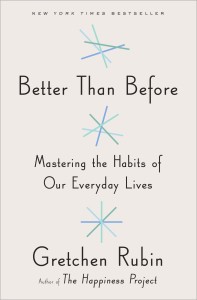'Better Than Before'?
 In Better Than Before: Mastering the Habits of Our Everyday Lives, author Gretchen Rubin attempts to help readers form the habits they want, partly by recognizing their own tendencies. The 320-page hard cover edition, published by Crown, retails for $26, and the ebook is $13.99.
Overview:
In Better Than Before: Mastering the Habits of Our Everyday Lives, author Gretchen Rubin attempts to help readers form the habits they want, partly by recognizing their own tendencies. The 320-page hard cover edition, published by Crown, retails for $26, and the ebook is $13.99.
Overview:
Rubin declares herself surprised to understand that not all people enjoy forming habits the way she does, so she sets out, mostly through trial and error on herself, friends, family, and occasionally strangers, to determine what helps and inhibits people when they attempt to create a habit.
She divides people into four main categories — Upholders (like herself), Obligers, Questioners, and Rebels. She then takes the reader through tips for easier habit formation, as well as pitfalls to avoid.
Why you might like Better Than Before:
Rubin offers good, practical advice — things like making good habits convenient for yourself and bad ones inconvenient.
She doesn't accept excuses. If you happen to know her (I don't), you would be better off not mentioning something you'd like to change unless you're prepared to actually make changes. She will call your bluff. This is what many of us need to hear.
If you resist forming habits, Rubin will give you some tools for why, though her advice for some of her categories of people is decidedly better than for others.
If you already like creating new habits, this book will give you even more strategies for doing so.
Rubin uses lots of personal stories in the book, and if you find her relatable, you will love that.
Why you might not like Better Than Before:
Though Rubin clearly has the capacity to do scientific research — she was a clerk for the Supreme Court — she chooses to make her points with anecdotal evidence and research she has done from social media. For the most part, she leaves out discussion of genetic predispositions, what addiction can do to the brain, and other hard science.
Rubin admits that she likes forming habits and has an easy time of it. This can leave the reader feeling a bit like a student in a class with a genius teacher who simply doesn't understand why they can't get advanced calculus.
Her tone can sometimes seem downright bullying. You may put the book down feeling sorry for the friends and family who have benefited from Rubin's "help." She admits that she can be too pushy, and many of her anecdotes are uncomfortably candid about other people's shortcomings. At the same time, Rubin's only vices seem to be drinking too much diet soda, which she doesn't believe is a vice, and giving up on meditation.
While Rubin says she wants people to form their own habits, she spends a disproportionate amount of time touting her own, in particular a low carbohydrate diet. This seems outside her scope of expertise, but she has no problem promoting it.
My conclusions:
If I wanted to hire someone to push me to put aside excuses and form habits, I would consider Gretchen Rubin (not that she does this work).
But I would rather find a more measured, scientific approach to habit formation, one that relies on broad and deep studies rather than Rubin's "data point of one."
Full disclosure: I received an advance reader edition of Better Than Before from the publisher. I was not required to write a positive review. These are my opinions.
